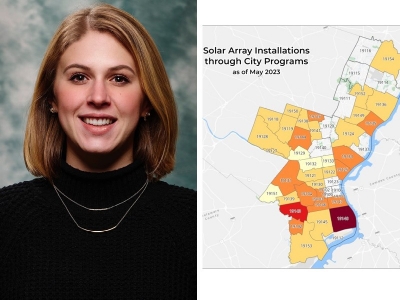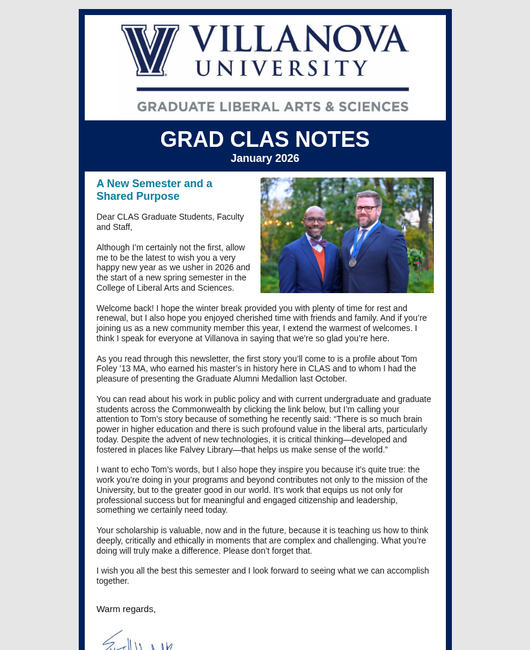Environmental Science Alum Guides Philadelphia on Path to Sustainability
Charlotte Shade’s research work and use of Geographic Information Systems (GIS) helped prepare her for a career that blends her passion for sustainability with the skills to help solve complex environmental issues.

In her role as Program Manager for Renewable Energy at the City of Philadelphia’s Office of Sustainability, Charlotte Shade ’19 MS focuses on municipal energy conservation, efficiency and emissions reductions. Some of her responsibilities include buying renewable electricity for city buildings, mapping the potential for solar panels and analyzing energy use data.
Shade’s research work and use of Geographic Information Systems (GIS) in Villanova’s master’s program in Environmental Science helped prepare her for a career that blends her passion for sustainability with the skills to help solve complex environmental issues.
“One important initiative I am working on right now is helping to convert Philadelphia’s vehicle fleet to EVs. The city owns more than 5,000 vehicles, which add greenhouse gases to our atmosphere. Switching our gas cars to electric helps decrease the city’s use of fossil fuels and greenhouse gas production,” she says.
Shade’s thesis project at Villanova analyzed how Philadelphia’s green infrastructure program may help the city adapt to climate change. The project gave her the skills to learn new technology and manage large projects and allowed her to make important connections to advance her career.
“I knew I wanted a career that utilized GIS, which is why I chose to attend Villanova and work with Dr. Peleg Kremer,” Shade says. “My background in GIS was crucial to analyzing the data and building the climate change models that I needed in my research.”
Shade published a portion of her thesis as a journal article titled “Predicting Land Use Changes in Philadelphia Following Green Infrastructure Policies” in the journal Land.
Today, her skills in GIS and data analysis not only help her with her own work responsibilities but also have allowed her to become the “go-to” data analyst for her department.
“For my own projects, I use my GIS skills to analyze the suitability of buildings for solar panels,” Shade says. “Additionally, I can map out where we have electric vehicle chargers and where we may want to install more. I also help my colleagues on other teams with mapping flood damage across the city.”
While GIS has been an important component of Villanova’s graduate program in Environmental Science since its inception, the program recently created a new graduate GIS certificate to meet the growing demand for professionals with GIS expertise and prepare students for careers across industry, business, government and non-profit organizations.
“The new GIS certificate will allow Environmental Science students to explore environmental issues at various scales and build a portfolio of spatial analytics projects,” Shade says. “The courses will prepare them for jobs in the private and public sectors, and the certificate on their resumes will demonstrate to employers that they have advanced training in this important technology.”


